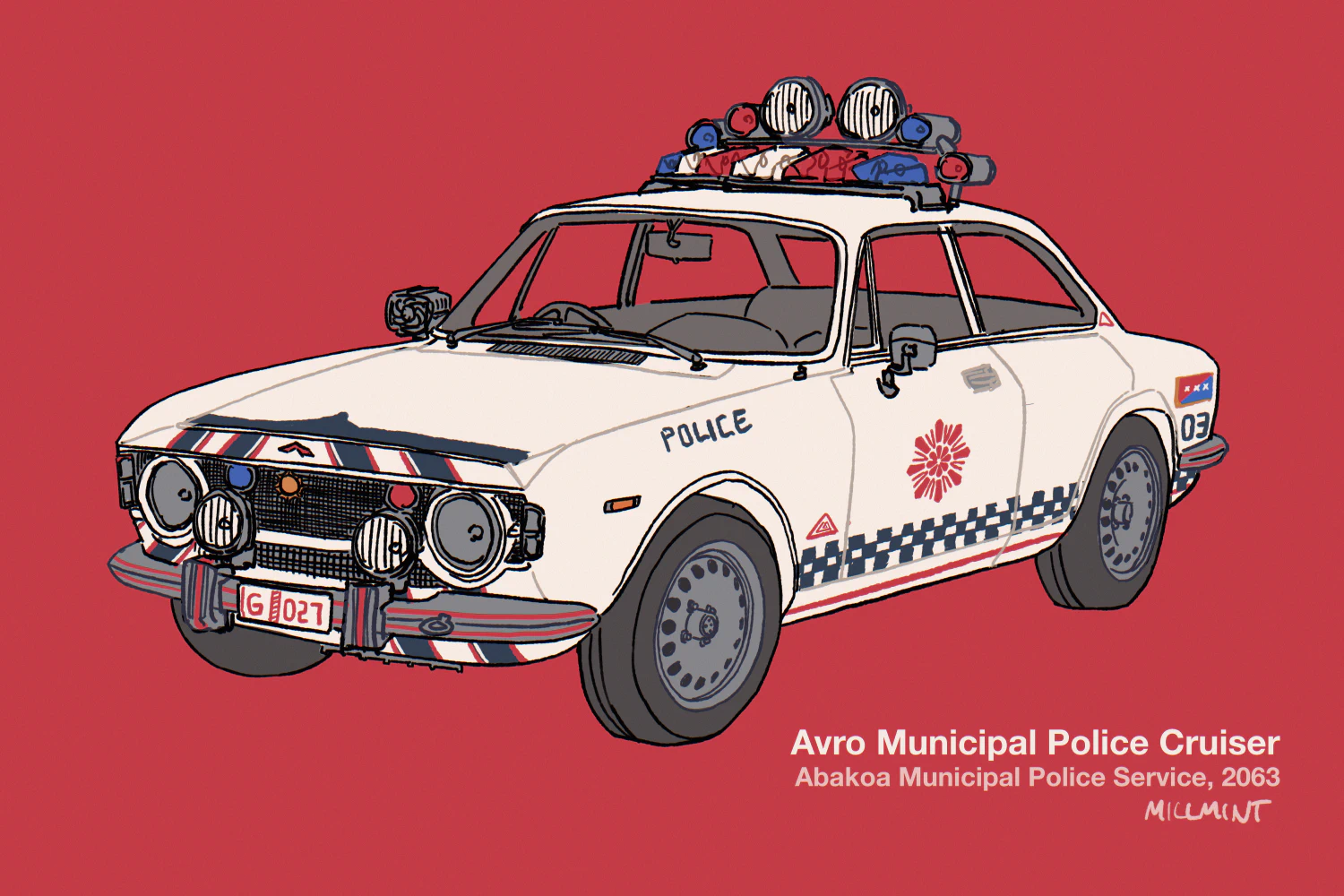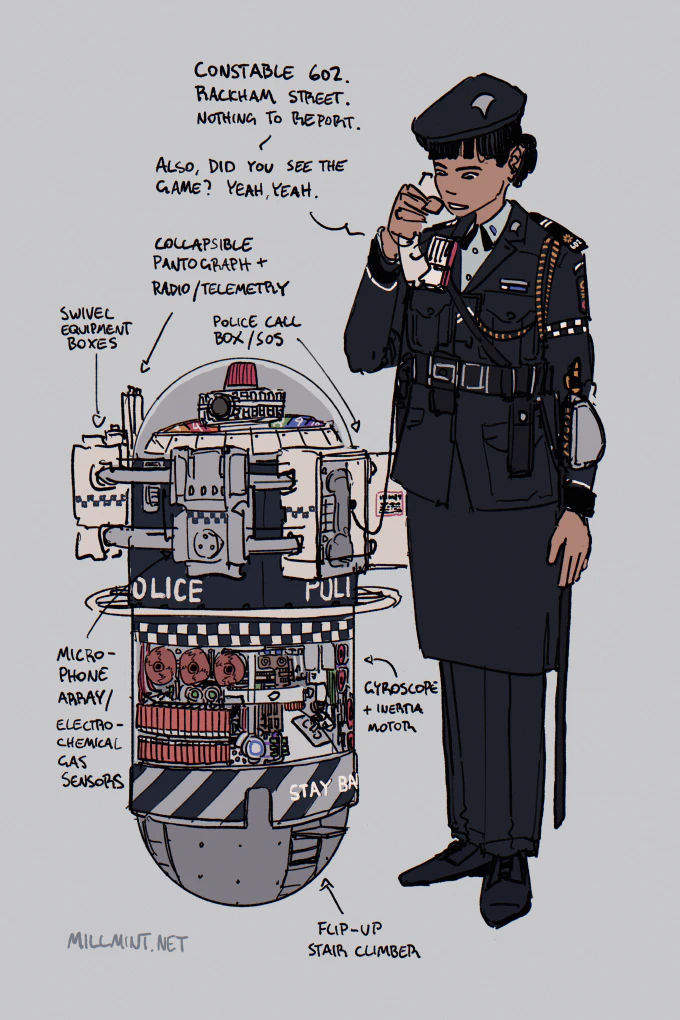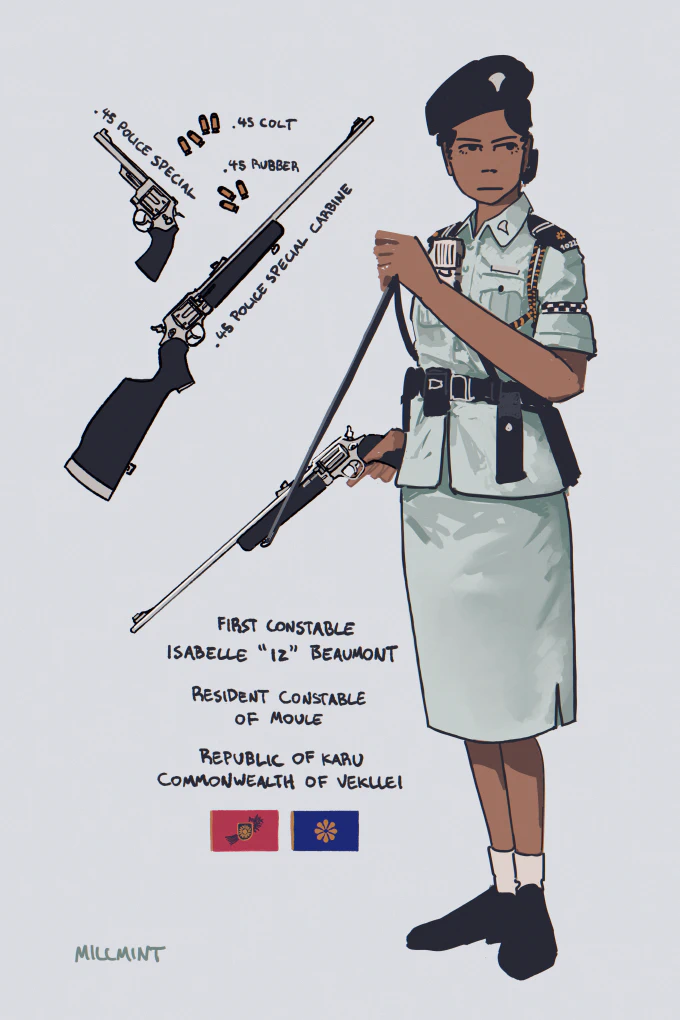NEW Story: Nuclear Interceptor
Commonwealth Police Service

The Police is part of the Law Parliament.
The Commonwealth Police Service or Constabulary is the unified police service of Vekllei, operating under the Parliament of Law. Rather than separate departmental forces, the Constabulary is a fluid service system where officers hold multiple specialist endorsements and shift between roles as community needs demand. This allows a parish constable to serve as a marine specialist during fishing season, or a detective to mediate disputes in Vekllei’s often-chaotic commons.
All constables are commissioned under Commonwealth authority but serve distinct functions based on their active endorsements and deployment requirements. This means policemen1 may take on many roles and uniforms as part of their service, and helps reduce jurisdictional overlap between police services. This structure suits the Commonwealth’s scattered island geography, and helps retain strong professional standards among their constables.
Philosophy and Structure #
Vekllei has a policing system designed to address the country’s federal structure, geographic diversity and multicultural population. It requires flexible, multi-disciplinary personnel.
For communities, the model ensures access to appropriate specialists, helps preserve Commonwealth localism and supports cultural continuity through integrated community policing. For officers, it offers career variety, geographic mobility and promotes ongoing professional development. For the Commonwealth, it facilitates efficient personnel use, rapid specialist deployment and a system suited to its disparate and federal structure.
One Constable, Many Roles #
Every officer begins with fundamental Constable training at the Commonwealth Police College, which establishes a shared professional foundation. Successfully completing training awards a base commission, which confers the right to enforce laws and make arrests. From there, they earn specialist endorsements rather than transferring between rigid departments. A constable might serve as a parish officer on Monday, detective on Wednesday, and sea marshal over the weekend – all under the same unified service.
The Commission System #
All officers hold a base commission status as their foundation, which allows them to enforce Commonwealth and jurisdictional law and make arrests. They can diversify their role through endorsements, which require successful completion of specialised training programmes.
Endorsement Categories include:
- Territorial: Parish, Municipal, Republic, Federal jurisdictions
- Functional: Detective, Marine, Traffic, Tribal, Migrant, Commons Mediation
- Detachments: Ranger (Polar, Equatorial, Coastal), Frontier Patrol, Port Warden, Urban
- Special: Treasury, Parliamentary, Transport, Company (Rifles, Animal, Riot)
Constables maintain active status in their primary role and hold reserve status in other endorsed areas. Reserve endorsements activate during seasonal demands, emergencies, specialist requirements or staff shortages.
Deployment #
The Duty Roster System maintains each constable’s capability matrix showing current active role, available reserve endorsements, specialist skills, languages and activation availability. Regional Police Circuits manage deployment through routine seasonal shifts, priority specialist calls, emergency deployment, and voluntary role changes.
Seasonal Constables shift roles predictably:
- Tourist season marine patrol and cultural liaison
- Storm season emergency response coordination
- Fishing season port wardens and maritime safety
- Assembly season municipal security and crowd management
Circuit Riders travel between small islands on regular schedules, carrying portable equipment and maintaining communication links to provide specialist services to remote areas.
Organisational Structure #
Executive Command
Commissioner, Commonwealth Constabulary
Deputy Commissioner for Operations
- Assistant Commissioner for Federal Services
- Assistant Commissioner for Republic Services
- Assistant Commissioner for Special Operations
Deputy Commissioner for Standards
- Assistant Commissioner for Training
- Assistant Commissioner for Professional Standards
- Assistant Commissioner for Police Democracy
Secretary for Legal Affairs
Secretary for Intelligence & Analysis
Secretary for Communications
Secretary for International Cooperation
Regional Police Circuits
- Volcanic Police Circuit: Oslolan Metropolitan area, volcanic circuit
- Arctic Police Circuit: Arctic territories, remote area coordination, indigenous liaison
- Antarctic Police Circuit: Antarctic territories, remote island small-town policing, fishing protection
- Kalinan Police Circuit: Pan-Indies Caribbean operations, maritime coordination
- Atlantic Police Circuit: Azores, Madeira, Canary island circuits
- Verdean Police Circuit: African Atlantic territories, Portuguese heritage areas
- Antillean Police Circuit: Continental Caribbean operations, international borders
- Lucayan Police Circuit: Lucayan islands circuit, maritime patrol
Service Branches #
Federal Constables serve Commonwealth-wide functions:
- Commonwealth Constables: Also called Police of the Parliament or Federal Police, serving premier federal law enforcement roles
- Commonwealth Marshals: Fugitive pursuit, witness protection, cross-republic crime investigation
- Commonwealth Rangers: Environmental protection, national parks, marine reserves, uninhabited territory patrol, tribal policing
- Treasury Constables: Financial crime investigation, customs enforcement, revenue protection
- Parliamentary Guard: Government facility protection, Directory security, ceremonial duties
- Transport Police: CommRail security, ferry services, airports, space facility protection
- Commonwealth Police Companies: Specialised police sections for dedicated purposes.
- Rifles Section – Armed response, special weapons and tactics
- Animal Section – Canine, horse and special tracker units
- Riot Section – Affray, public disorder, rioting
Republic Constables serve local community functions:
- Republic Constabulary: Also called Police of the Public, general policing within each republic’s boundaries
- Parish Constables: Community policing in smaller settlements, often part-time and elected locally
- Municipal Guards: City centre policing, event security, traffic management, tourist liaison
- Port Wardens: Harbour safety, maritime law within republic waters, fisheries coordination
Training and Professional Development #
Commonwealth Police College #
The Commonwealth Police College is a network of training facilities that provide all constables complete standardised foundation training with specialisation tracks. The curriculum emphasises Atlantic Municipalism, civic values, and local competency across their diverse republics. It also encourages new recruits to pursue specialist endorsements to vary their work and improve their skills in law enforcement.
Training Structure:
- Foundation Course: 6-month Commonwealth Constable certification
- Primary Endorsement: 3-month specialist training for chosen focus area
- Secondary Endorsements: 2-week intensive courses for additional capabilities
- Continuing Development: Annual refresher requirements and new endorsement opportunities
Local facilties called Republic Training Annexes provide local skills training, cultural and language instruction, community policing methods specific to each region and republic-specific law and procedure.
Professional Development #
Police in Vekllei have a strong culture of education that encourages constables to gain new endorsements annually through rotation assignments, mentor across specialisations and integrate into their communities.
Career pathways emphasise horizontal development through multiple endorsements.
Example
- Community Generalist: Multiple local endorsements for comprehensive local service
- Regional Specialist: Deep expertise in particular functional area
- Circuit Officer: Multi-island deployment; the travelling constable
- Crisis Responder: Multiple emergency response endorsements
Leadership development spans multiple functions with supervisors managing mixed-role teams, inspectors coordinating regional deployment, superintendents managing cross-endorsement training and commissioners providing strategic direction.
Departments #
General Headquarters
- Office of the Commissioner
- Office of Parliamentary Liaison
- Office of Legal Affairs
- Office of Security & Intelligence
- Office of Public Communications
- Office of Personnel & Culture
- Office of International Relations
Operations Department
- Office of Federal Services Coordination
- Office of Republic Services Coordination
- Office of Special Operations Command
- Office of Emergency Response Coordination
- Office of Inter-Island Operations
- Office of Maritime Services
- Office of Transport Security
Standards Department
- Office of Training Standards
- Office of Professional Conduct
- Office of Police Democracy
- Office of Cultural Competency
- Office of Equipment & Technology
- Office of Health & Security
Specialist Services Department
- Office of Criminal Investigation
- Office of Financial Crime
- Office of Cultural Heritage Protection
- Office of Commons Enforcement
- Office of Environmental Crime
- Office of Forensic Services
Intelligence Department
- Office of Criminal Intelligence
- Office of Strategic Analysis
- Office of Surveillance Operations
- Office of Counter-Intelligence
- Office of Frontier Intelligence
Support Services Department
- Office of Communications & Technology
- Office of Vehicle & Equipment Management
- Office of Facilities Management
- Office of Medical Services
- Office of Legal Support
Regional Coordination Department
- Office of Circuits
- Office of Deployment
- Office of Supply
- Office of Inter-Republic Liaison
Commissions and Boards #
- Police Democracy Commission: Maintains professional standards, investigates misconduct, ensures community accountability
- Training Accreditation Board: Oversees endorsement programmes, validates specialist training, manages ongoing education requirements
- Community Relations Board: Facilitates civilian oversight, manages community complaints, promotes police-community partnerships
- Equipment & Technology Board: Evaluates new technologies, standardises equipment across services, manages procurement
- Cultural Heritage Advisory Board: Guides heritage protection policies, liaises with indigenous communities, oversees cultural crime investigations
Equipment and Technology #
The Commonwealth Police employs a distinctive mixture of traditional tools and modern technology that reflects the unique character of their service.
Police Droids #
Like many countries, Commonwealth policing involves the widespread deployment of autonomous police droids built by National Machines for routine patrol and support functions. These barrel-shaped robots operate under remote control from Automatic Asset Command centres, using sophisticated optical computers to process their sensor data and coordinate responses. Rather than replacing human officers, the droids handle tedious tasks like traffic control, area monitoring, and equipment transport.
The droids are deliberately non-threatening – they carry no weapons and instead rely on their ability to physically interpose themselves between combatants, using their substantial mass to harmlessly but persistently ram attackers until human officers arrive. Constables can summon droids via radio to block roads, provide emergency phone access, or conduct environmental monitoring for hazards like carbon monoxide leaks.
They have a modular equipment system, with different tool boxes that lock onto a circular swivel rail around the droid’s midsection. Standard modules include first aid kits, emergency communications equipment, crowd control speakers, and dazzling lights for visibility and crowd dispersal. They can also carry secure firearms containers to deliver rifles to police if necessary.
Personal Equipment #
Commonwealth constables carry a distinctive combination of traditional and modern weapons that reflects both practical necessity and cultural heritage. The standard sidearm is the .45 APC Police Special, a robust revolver designed specifically for law enforcement use. Officers also carry a lengthened carbine version of the same weapon, featuring a stock, lengthened barrel and foregrip that transforms the revolver into a short rifle for situations requiring greater range or accuracy. Both weapons use interchangeable ammunition, with officers carrying both steel and rubber cartridges depending on the situation, along with speed loaders for quick reloading.
In addition to firearms, all constables are trained with sabres, which serve multiple practical purposes beyond their ceremonial significance. The extra reach and intimidation factor of a blade often prevents situations from escalating to the use of firearms, while the extensive saber training builds physical conditioning and discipline. Officers may opt to carry steel batons as well, or instead of the sabre in certain situations.
Specialised Equipment #
Different endorsements require specialised gear suited to their particular functions. Marine constables carry waterproof communication equipment, rescue gear, and specialised maritime firearms resistant to saltwater corrosion. Rangers operating in Arctic conditions have cold-weather gear, survival equipment, and long-range communication systems capable of functioning in extreme isolation. Detective endorsements include portable forensic kits, evidence collection tools, and sophisticated camera equipment for crime scene documentation.
Communications Technology #
Many rural constables carry collapsible pantograph radio equipment that provides reliable communication across Vekllei’s challenging geography. Officers also have access to portable telemetry systems for transmitting location data and coordinating complex operations across multiple islands. All constables carry a basic radio.
-
Vekllei does not typically gender titles, so women officers are also referred to as ‘policeman.’ Specifying gender produces strange phrases like ‘woman policeman’ or ‘male policeman.’ ↩︎

